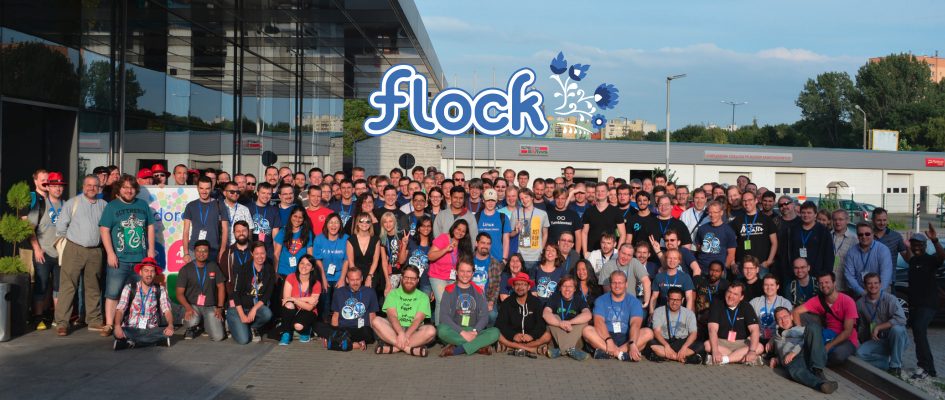The fourth annual Flock conference for Fedora contributors took place from August 2nd-5th in Krakow, Poland. Over 200 developers and enthusiasts from different continents met to learn, present, debate, plan, and celebrate. Although Fedora is the innovation source for a major Red Hat product (Red Hat Enterprise Linux), this event received “gold” level sponsorship from a sister community — openSUSE. openSUSE serves the same function for SuSE Linux Enterprise as Fedora does for RHEL. SUSE showed the fellowship that rules in the open source world, which is why we love it!
The first two days of Flock centered around presentations. The first step was to present numbers showing the past year’s accomplishments. This was day one’s opening keynote by Fedora Project Leader Matthew Miller. The number of contributors has reached 2000 and is growing. Miller also shared his goals for the upcoming year: convert to Python 3, start implementing modularity, and develop Fedora Hubs.
Then the day turned into dozens of breakout sessions.The hottest topics were containers, Project Atomic, security, outreach efforts, community building, and team updates and plans from around the Fedora community. In the evening, people could stay in the Flock hotel to play board games, or travel to the city center for guided tours. The guides were funny and taught us a lot about Polish culture and history. You’d never believe why they decided to keep a big city tower in a time when citizens so poor they were breaking buildings to sell bricks.
On day two, a second keynote was delivered by Radosław Krowiak about teaching programming for children at Akademia Programowania in Krakow. The talk was about much more than just programming, though; it was about creativity. Krowiak stated that scientific subjects like engineering, math, or physics, aren’t taught in creative environments and aren’t considered cool. Therefore, kids don’t realize how important these subjects are. Still, what was the most awe-inspiring “aha” moment of this session? The results of a creativity test designed for NASA by George Land. According to Land’s testing, by reaching adulthood, we only retain 2% of the creativity we had as five-year-olds.
Krowiak explained most educational systems strip us of inventive thinking and implant a conventional “This is how it’s always been done” mindset. The setting for this talk was perfect, since Flock offers a solution to this problem. The conference helps you join a community that creates original hacking solutions for collaboration. That community is also part of the driving force in the major industry of the century. Once again, dozens of sessions rounded out the day. The evening program of day two was a boat trip on a river in Krakow. Could it get more awesome?
The last two days shifted from theory to practice, and from ideas to planning. The workshop schedule started with the largest group of lightning talks yet at Flock. On days three and four, you could build your first module, a kernel, an official OpenShift Origin instance on Fedora, a Fedora badge, or a Fedora containers library. Alternatively, you could help plan Fedora security, documentation, budget, marketing, Fedora infrastructure, or meet the Fedora Ambassadors Steering Committee (FAMSCo). The sequence of three evening events ended with class, in a local Krakow brewery.
Flock organizers went to great effort to land a first class event. The community showed they go the extra mile to make attendees feel welcome and help you get involved. Are you creative? Do you like learning new technology and meeting new people? Are you good with languages? If you answered at least one yes, Fedora can be for you.
Here are some parting comments from attendees:
It was amazing event with a lot of information. Thanks to everybody and remember that #fedoralovespython! — Lumír Frenzy Balhar
Feeling the post-#flocktofedora mix of energized and exhausted. Thanks to everyone who makes this conference so amazing every year! — Matthew Miller
It was amazing [sic] to be part of it! — Redon Skikuli
For more details, check out the videos, a list of blog posts written about Flock, pictures, or the Twitter feed. You can explore contributor options, read a contributor guide (or a shorter PDF guide), or try Fedora itself. You can also contact the Marketing team.






Sergio
Thanks so much for all the information, videos and docs about the event.
They are so interesting I can’t stop checking them.
Natalie Ardasevova
Dear Sergio, thank you so much for the feedback! We’re glad to hear that! 🙂
wang ming heng
I want to become a Fedora developer one day.
Natalie Ardasevova
Dear Wang Ming Heng, the Fedora community will be happy to welcome you! You can explore the options of engaging as a developer in Fedora here: https://fedoraproject.org/wiki/Join#OS_Developer
rluzynski
I agree with what Natalie said here. Why that “one day” can’t be just today?
Viktor
Great to have all the videos. I didn’t have time to check them out, though. Is the current state of KDE discussed in one of the videos. At first sight it seems KDE wasn’t a topic at Flock. Is that correct?
Anyway, I love Fedora and KDE 🙂
Natalie Ardasevova
Hi Viktor, it seems that KDE was not a topic at Flock. However, you can ask the KDE SIG about the state of KDE: https://lists.fedoraproject.org/admin/lists/kde@lists.fedoraproject.org/ .
Also, direct research of the available packages is a good idea. 🙂
Etna
The link to OpenSUSE is broken. https://opensuse.org does not work; it needs the ‘www’.
Natalie Ardasevova
Great news! You can now listen to a podcast about Flock, made by Chris Ward! Includes interviews with Brian Exelbierd, Jonathan Dieter, and Redon Skikuli. Length of each ranges between 10 mins and 14 mins. A great way to get to know some long-term members of the community! https://soundcloud.com/chris-ward-908424795
rluzynski
I think I saw the previous version of Redon Skikuli’s quote saying “amaxing” rather than “amazing” and “[sic]” suggests it was intentional rather than a typo. Otherwise what would he mean by putting “[sic]” there?
Natalie
rluzynski, good point. I believe it was ‘amaxing’ as well, I think someone in the editorial may have automatically corrected it as they were going through the text and didn’t realize the pun. Apologies to the author.